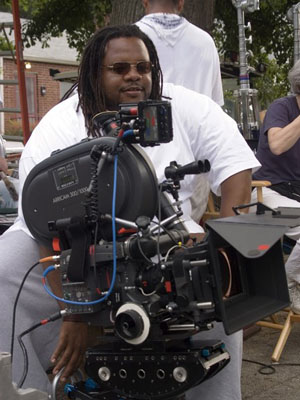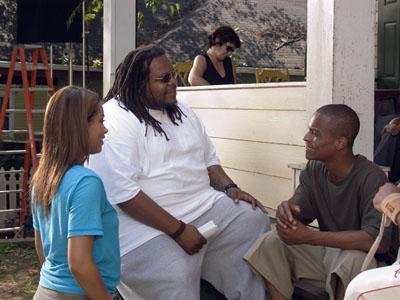
Chris Robinson
The Thirty-Eight Year-Old Virgin (Filmmaker) Celebrity Scoop with Joel Fowler It’s as simple as black and white. If I say the name ‘Chris Robinson’ and you’re Caucasian, the mental picture that’s probably pulled from your cerebral Rolodex is that of the hard rockin’, hard livin’ lead singer of the musical group The Black Crowes and husband to starlet Kate Hudson. Yet, if you’re African American, you know ‘Chris Robinson’ as the award-winning music video director that’s been the toast of alphabet city (BET, VH1, MTV) for the last decade; his collaborations featuring only the brightest of talents (P. Diddy, Alicia Keys, Jay-Z, and Erykah Badu just to name a fraction of the list).
Trying to find out information about the black Robinson off the Internet is a near fruitless endeavor, as the white rocker’s stoned mug keeps popping up again and again. The shared moniker mix-up is one that’s all too familiar to the behind-the-camera man, who’s embarking on his first big press tour in promotion of ATL, his debut feature-length film. “You know, it’s funny; I was in L.A. at a party not too long ago, and the other Chris Robinson was there, and I introduced myself. He laughed and said, ‘No [expletive]! People come up to me all the time asking if I’m directing music videos now!’ It’s nice to know that he’s getting mistaken for me sometimes.” Skin color is just one of the many differences these two Mr. Robinson. While one is painfully thin, the other’s a big, confident man who used his heft to earn a spot playing offensive line for a small school, Foothill College, that’s literally in the shadow of Stanford University in Los Altos Hills, California. Coming from Edgewood, Maryland (a small town about twenty-five miles north of Baltimore), the journey to the West Coast was a true life ‘coming of age tale’ for Chris, a personal sentiment he infuses into ATL, his film about a group of four high school seniors about to embark on wide-open futures. It was at Foothill where Chris first started to figure out what his professional dreams actually were. “I thought I was going to be on the radio [as a deejay]. But, that’s about the time I started picking up Spike Lee’s books, like She’s Gotta Have It and School Daze, and read them cover-to-cover. For a kid that was not too big on school, that’s saying something, but they became like bibles to me. I started to learn more about film from a teacher who was really a [expletive], really pushing me to do more because he could see that I had it in me.” After a few years in Los Altos, Chris move onto a semester at San Jose State before landing his first big break, which came oddly enough in Scandinavia. “My friend who suggested I go to Foothill was an Olympic high jumper named Jerome Carter. Somehow, he got some sort of record deal from a company in Sweden, and he had me come over to shoot the videos for him. The music was horrible; the videos were whack, but I thought, ‘I’m really doin’ it!!’ Looking back, it’s a little embarrassing, but you gotta start somewhere.” Sweden led to Germany and then on to Belgium before finally coming back to the States, all the while crafting a style that would come to turn the heads of music executives always on the lookout for crisp, new ways to spotlight their artists. Needless to say, Chris learned a few tricks of the trade in his close to twenty years in the short-form profession, but he also picked up a few bad habits too as it pertains to feature filmmaking. “[Videos are like] four minute movies. But, what’s nice about a video is, if I get into trouble telling my story, I [can] cut to somebody singing or somebody dancing. There’s a safety net there. A movie is much more intense… I’m crafting a story so everything you see [on screen], I have to make you believe it… [Making a movie] is 100% harder because it’s so different from video. It’s like having a football field with all these little puzzle pieces scattered about it, and it’s your job as the director to put them all together, because what I shoot on Wednesday has to match emotionally to what I shot two weeks ago, and it all has to be seamless.”
That’s not to say ATL is a grand departure from the artistic world in which Chris Robinson was developed. The Will Smith produced film, whose working title Jellybeans had to be scrapped for legal reasons, stars rapper Clifford “T.I.” Harris as Rashad, a concerned orphan who becomes his brother Ant’s (Evan Ross Naess) keeper after their parents’ deaths. Rashad must set a strong example that there are other ways out of their Atlanta ‘hood then selling drugs for thugs like Marcus (Antwan A. Patton, a la Big Boi from the hip-hop duo OutKast). No matter how much experience Chris may have had on music videos, that didn’t mean much to studio executives looking to earn a dollar. “Hey, at this point, I’m a freshman all over again, and so the studio treats me like a New Jack. I wanted to bring my entire video crew to do the film, but they [Warner Brothers] weren’t goin’ have that because it’s their investment. They had only a little trust in me, but since Will is such a big star, and he sort of gave us a nod that ‘these guys know what they’re doing’ with his production company’s backing. So, we had their $20 million [to make the film], and I got to use some of my people on set, like my DP. Even though I love my editor on this film, he’s still not my editor, but hopefully with time that’ll change.” If there is one last difference between the black and white Chris Robinsons, it’s their polar opposite migratory pattern. The rocker was born in Atlanta and moved to California (with his wife and child – another piece of the comparison equation the film helmsman doesn’t have to bother himself with). For the director, a man who’s been in Los Angeles way too long, the South may be beckoning. “Atlanta has such a different flavor. I wanted this city and its music to be a central character in this film. So, I wasn’t too upset about the name change featuring the city because I hope this film is distinctly ATL. I mean, I lived in Atlanta for six months [for pre-production and filming] and now I want to move there permanently.” With a little more success, say with a box office winner in ATL, maybe people will soon have to preface themselves when they talk about Chris Robinson. The day people start asking ‘do you mean the musician or the filmmaker?’ is the day this director wins, because then it’s not such a black or white question after all. | ||
|
©2006 Thomas Huff and Joel Fowler, BlownPotential.com Any suggestion? E-mail tom@blownpotential.com. |

